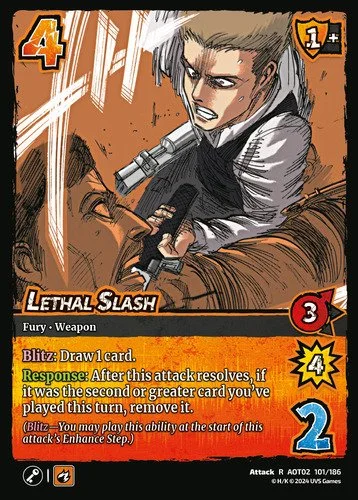Two Players, One Voice
A Critique of Blitz and the Emotional Balance of UniVersus
by Andrew Holder
Hey everyone!
If you're reading this, you probably know who I am — but just in case: I’m Andrew Holder, longtime Universus player, former competitive grinder, and content creator. I played this game heavily for four years through thick and thin: MHA01 power spikes, character rebalances, format shifts, and yes, even playing Mr. Brightside in 13 tabs at 3:49 in the morning (don’t ask). I’ve always loved Universus because it made me feel like I was playing every second. I felt like I was part of a conversation, not just watching my opponent monologue.
I took a break for about a year because I stopped having fun. These days, I play super casually. It’s mostly webcam pickup games with friends on Discord. But even now, something feels off. I’ve been trying to figure out why the game doesn’t hit the same. And the more I think about it, the more I realize: it’s Blitz.
Let’s take a step back.
You see these cards? You might be wondering what they have in common. They’re aggressive. Explosive. They create movement. But after playing against them — again and again — you start to notice something.
Or maybe, you stop noticing something.
It’s the part where your opponent gets to interact with you.
Because that part? It’s vanishing.
Let me explain.
Kyoka Jiro 1 dominates play equity. She responds for stats, then flips Electric Jolt to commit your piece of interaction. She plays most of the game at response speed — and by the time she finally uses an enhance, she’s often already activated two or three abilities before you’ve even touched your board.
Dragon Strike is similar. Your opponent gets to respond and flip something on your side, then opens with a first enhance that eliminates your options altogether. I really enjoy playing with Dragon Strike. Does that make me a hypocrite? You know, I’ve never really thought of it that way.
I used to love high-tempo, aggressive decks. I piloted Fourth Kind to a couple of regional top cuts because I loved how it could disrupt opponents without completely silencing them. There was always that tension: “Will they survive this string? Do I leave myself open by overcommitting?” It felt like a conversation.
But now? Blitz is like shouting over your opponent every turn. You get free resources. Instant pressure. Guaranteed disruption. You don’t build toward a turn, you just have it.
The biggest offender isn’t even a single card.
It’s how any character, with enough Blitz abilities, can suddenly feel like the most oppressive characters we used to dread. Every deck gets mini-Jiro moments. Every deck gets a piece of the Dragon Strike pie. And when everyone’s a high-speed engine with auto-disruption baked in, where’s the space for the other half of the game — defense, baiting blocks, mind games?
It’s not that Blitz is “broken.” That’s not what I’m saying.
My concern is that Blitz tilts the emotional balance of Universus. The game starts to feel less like a duel and more like a performance — one player on stage, the other stuck in the audience, waiting for their turn to clap.
And here’s the other side of the coin:
Blitz hasn’t just changed how offense plays, it’s warped what defense has to be.
Defensive decks now have to go all-in on sheer volume. It’s not enough to have a couple of interaction pieces anymore. Decks like Rodan, Ghidorah, and Taryon Darrington are forced to overload their boards and hands with answers just to keep up. Twitch chat groans when Rodan shows up on stream during a regional, because they know what the game will be: the Rodan player praying they can bait the opponent into overextending, so they can try to win on the backswing.
Blitz has crushed midrange.
Decks that once blended defense and offense now must pick a side and commit hard. You either keep up with the blitz train or get left behind. It feels like you’re required to be so intensely committed to your angle of attack or defense just to survive.
You’re Kevin Broberg playing Hange Zoe, Four-Eyes, giving -6 damage on every attack to win Worlds.
You’re Andrew Porat piloting a backswing control deck to back-to-back regional wins.
You don’t win by interacting, you win by suffocating.
The only way to deal with the overwhelming pressure Blitz decks create isn’t to outplay them — it’s to out-wall them. And I think that’s a problem.
So is it me? Is it the game?
Yeah. It’s both.
I’ve changed. I don’t want to grind hundreds of hours figuring out Life Overhaul. I don’t want to break the meta or discover the next Ojiro 2. I want nuance. I want interaction. I want to feel like the person across from me is part of my game — not just a victim of it.
And the game? Right now, it’s chasing a faster, flashier kind of fun.
That’s okay. Games evolve.
But I think there’s something worth holding onto, something that’s been part of Universus from the very start: the joy of the fight. Not just the damage. Not just the wins.
The fight itself.
The choices.
The counterplays.
The silent tension of an empty card pool and a single card in hand.
Blitz, in its current form, mutes that experience.
It turns a dance into a sprint. And maybe some people love that. But for me?
I miss the moments where both players were really, actually playing.
That’s what brought me here in the first place. That’s what made this game feel like more than just numbers and keywords. And I still believe Universus can get back to that.
Whether it’s through tweaks to Blitz, stronger design guardrails, or just a return to interaction-first design, I believe this game can rediscover its voice.
Until then, I’ll be here. Still playing. Still watching.
Still waiting for that one turn — the one where it’s not just about me.
But about us.




